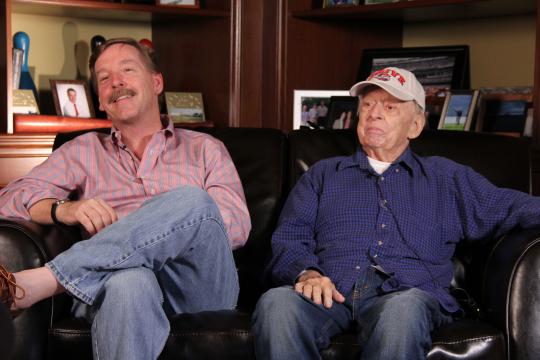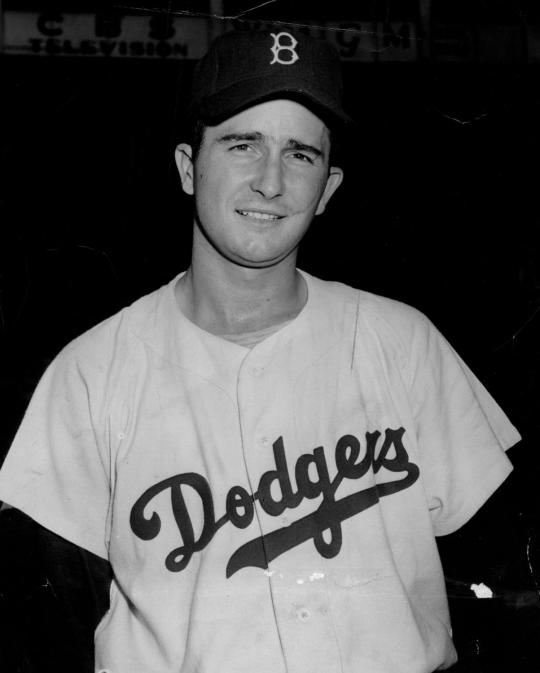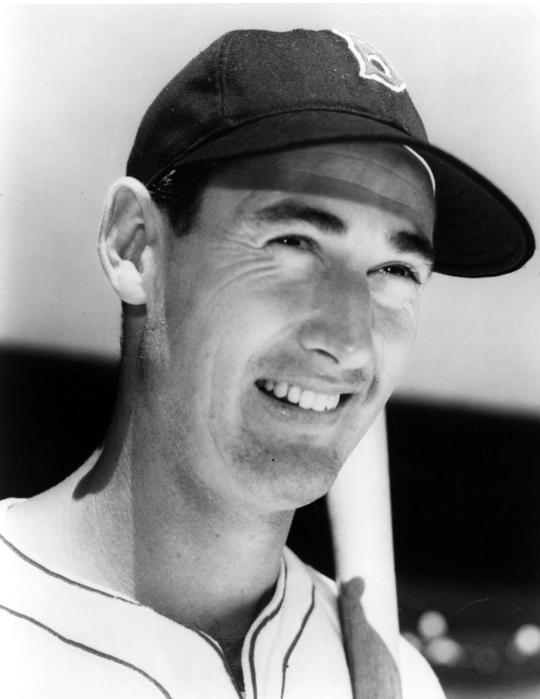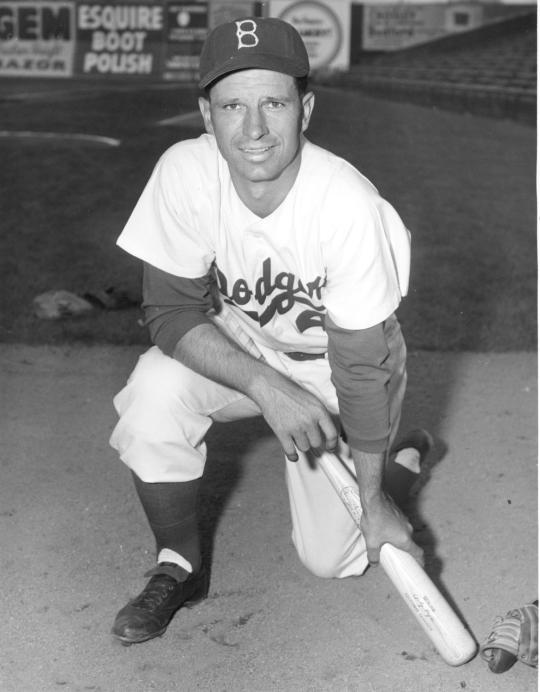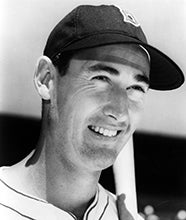To crystalize something like that in honor of my Dad, who raised me through those years, was an easy decision to make.
- Home
- Our Stories
- A Father, a Son and a Legacy
A Father, a Son and a Legacy
For Bill Janetschek Jr. and his father, baseball has always been at the center of their relationship, a connection between father and son. They have shared a passion for baseball, creating family traditions and priceless memories together. Now, that connection will be shared by visitors to the National Baseball Hall of Fame and Museum as they relive their memories of some of the greatest seasons baseball has ever known.
The Museum’s new Whole New Ballgame exhibit will be part of the new Janetschek Gallery on the Museum’s second floor thanks to a generous gift by Bill Jr. in honor of his father, Bill Janetschek Sr. The exhibit, which officially opens Nov. 6-7, will feature the story of baseball from 1970 through the present, told through artifacts, photographs and video clips from the Museum’s unparalleled collections.
On Father’s Day Weekend, the Hall of Fame’s multimedia crew sat down with the Janetscheks to talk about the donation, their love of baseball and the role the Hall of Fame has played in their lives.
Bill Janetschek Jr.’s support of the National Baseball Hall of Fame and Museum – in honor of his father, Bill Janetschek Sr. – will result in a new Museum exhibit this fall that tells the story of baseball’s modern era from 1970 through the present: A Whole New Ballgame. (Ken Meifert / National Baseball Hall of Fame)
Interview
HOF: I want to talk to you about your first baseball memories. Baseball has a way of creating lifelong memories. The Game has a way of conjuring up images of the past while you’re watching the game in the present. Talk about your earliest memories whether it’s having a catch in the back yard with your dad or whether it’s taking Bill Jr. to little league.
Bill Sr.: I fell in love with baseball in 1948. We lived in Flushing and we moved back to Brooklyn, and moving back to Brooklyn changed everything. Because if you weren’t a Dodger fan back in those days, there had to be something wrong with you. And I just happened to move back into the city when they’d gotten probably the best players they ever had. They had Gil (Hodges) and Jackie (Robinson). And a third baseman a lot of people don’t give credit to, Billy Cox. He had the softest hands, in fact that was his nickname, Hands. I never saw a guy be so slow about picking a ball…. And then in left field we had Andy Pafko. Center field we had the Duke and in right field you had Carl Furillo and one hell of a pitching’ staff. In fact I ran into a cousin, the pitcher relief for the Dodgers during the forties, and I know he wasn’t conning me because nobody walks around bragging about the name Erv Palica. It was a nice conversation. Then of course being a Yankee hater I gravitated to the Red Sox and Ted Williams.
HOF: Was it Ted Williams who moved you into that sort of fandom of the Red Sox?
Bill Sr.: Yeah, it was him. Best hitter I ever saw. Not the best player, but the best hitter.
HOF: Bill Jr. what are your earliest memories? You grew up in a house with a rabid baseball fan. Talk about that generational connection.
Bill Jr.: He won’t even remember this, but my earliest baseball memory is a game I didn’t go to. It was the 1969 World Series and my Dad got two tickets and I had an older brother and at the time I was seven and he was nine so he got to go and I didn’t. I remember watching the game on TV and wishing I could be there. When you go back and try to conjure up memories that you have, that was the first actual memory I had of a baseball game, watching it on TV. The earliest game I can remember seeing with my Dad was Willie Mays Day at Shea. At the time my Dad didn’t have much money. We were five kids so there were seven people going to the game. I don’t remember if all my sisters went but I remember my brothers being there and we sat either in the third to the last row or the second-to-last row in Shea Stadium, and Shea Stadium at that time sat 55,000 people so to say they weren’t the greatest seats would be an understatement. But I’ve been to a thousand games after that and that’s the most memorable game I’ve ever been to. I remember things so fondly. I can remember playing catch with my Dad when I was eight or nine years old. And when you think about our family, there are really only two things that really run through our family consistently. One is our faith and the other is baseball. Baseball has kept us together through thick and thin. There are times growing up as a young man when you have differences of opinion with your father or you have differences of opinion with your mother and sometimes you’ll wander away but we had Saturday tickets to the Mets in 1980, so in 1980 I was 18-19 years old no matter what every time the Mets were playing on Saturday, whether or not we were talking or not, it was a phone call made: ‘Who’s picking up who for the ballgame?’
HOF: Do you remember going to those games, Bill?
Bill Sr.: We went to some horrible games. I don’t know how those poor kids sat through some of them. In fact they might have amused themselves several times by chasing the pigeons that used to be at Shea, and there were kids on the block that went with us so it was a lot of fun.
HOF: Tell us about the first time you visited Cooperstown together. The Hall of Fame and the Museum has a way to connect generations when you see a player you may talked about with your son or with your grandsons. Talk about visiting the Hall of Fame and Museum together.
Bill Jr.: I originally went with my Dad, I was probably seven or eight and I’m a big baseball fan, but as a seven or eight year old trying to understand history, it’s a little rough… and I remember the only thing I was interested in was getting a souvenir. I wanted a souvenir before we even started the tour. We finally got to the souvenir stand and then I got my souvenir then I was a happy kid. I didn’t actually go back until probably 35 years later with my Dad. I’d gone back a couple of time with friends of mine and my boys but I remember walking into the (Plaque) Gallery and seeing the look in his eyes. It was like a kid in a candy store, and that’s when we got hooked.
HOF: Bill Sr., the first time you visited the Hall of Fame was it when you first took Bill as a seven year old?
Bill Sr.: Surreal. There were so many things to look at. The things that were really interesting to me were any connection to the Dodgers or to Ted Williams or Lou Gehrig, who was my first hero.
Bill Jr.: I remember snippets of it and it wasn’t that exciting but as you got older and you begin to appreciate the history, to have a place like the Hall of Fame and Museum is something that would leave an incredible void if we didn’t have it.
HOF: You have become instrumental in helping the Hall of Fame achieve its mission. Your generosity to the Hall of Fame and Museum is a wonderful tribute to the relationship you have with your boys and the game of baseball. Talk about why you wanted to connect in that way with the Museum.
Bill Jr.: History is important. You need it not just in baseball but for everything. I mean you learn from what you see in the past and so if I can be part of maintaining history, for something that I love, what better way to do it than to become affiliated with an organization like the Hall of Fame. I mean I do it selfishly for myself, I do it for my Dad and I do it for my kids because I’m sure, depending on how long I last, 20, 30, 40 years from now I hope they’ll have the love that I have and they’ll be taking their kids and their grandkids.
HOF: The very generous gift you made this year is going to put your name on a gallery at the Hall of Fame as a tribute to your father. Bill Sr., talk about when Bill came to you and told you what he wanted to do as a tribute to you in Cooperstown.
Bill Sr.: I was overwhelmed. Completely overwhelmed. I had no idea what he was even talking about at first until he filled me in on the exhibit and showed me the plaque that’s going inside. We had a very large party for my birthday and I overwhelmed with the number of guests. It’s only really begun to sink in the past couple of months. (He chuckles) I told a friend of mine, not too long ago, that I wasn’t good enough to get into the Hall of Fame as a player, but – ha-ha – I’m getting in the back door.
HOF: What does this gift mean to you? The decision must not have come lightly. But I can imagine in the same breath it was fairly easy.
Bill Jr.: It was one of the easiest things I’ve ever done. I’ve been working with (Museum vice president of sponsorship and development) Ken (Meifert) and (Museum president) Jeff (Idelson) at the Hall of Fame the last five or six years and you make a small contribution and you see a difference and then you think you can make a bigger contribution to make a bigger difference. And then when they came to me with the idea of doing something around the era of 1970 through today which is when I grew up, and everything I did away from the game and through the game was during that period. And so to crystalize something like that in honor of my Dad, who raised me through those years, was an easy decision to make.
HOF: You’ve seen some renderings of the exhibit. I know the designers have kept you in the loop on what it’s going to look like. Talk about when they came to you with the design for the Gallery.
Bill Jr.: Okay, I know baseball. These guys know baseball better than I, the thoughts that they had about that period, it could have been just a display of things from 1970 to this team and that team but that they picked some of the hard issues during that period that everyone talks about. And so as they walked us through some of the exhibits in the Gallery, I was overwhelmed with the thought process that went in to try and pick out the big items that had happened during those 45 years.
HOF: It’s a stunning exhibit, I’ve seen the renderings and the whole team in Cooperstown is part of building this and putting it together. It’s going to be a wonderful tribute.
Bill Jr.: And the only thing is when they’re putting the finishing touches on (laughing), you want to lean a little towards some Red Sox memorabilia and lean a little to the ’86 Mets.

